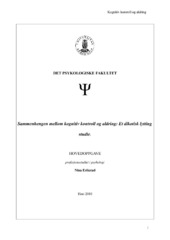| dc.contributor.author | Erikstad, Nina | |
| dc.date.accessioned | 2011-04-27T13:03:17Z | |
| dc.date.available | 2011-04-27T13:03:17Z | |
| dc.date.issued | 2010-11-23 | eng |
| dc.date.submitted | 2010-11-23 | eng |
| dc.identifier.uri | https://hdl.handle.net/1956/4703 | |
| dc.description.abstract | Background: Cognitive control is an executive function that helps people with inhibiting automatic and readily available responses in conflicting situations, and that aligns our behaviour with our goals. Reduced functions can be seen in different patient groups such as persons with Alzheimer's disease, schizophrenia and AD/HD. Elderly people often develop problems with cognitive control, and the aim of the present study was to examine this with a forced-attention dichotic listening paradigm. Method: 15 healthy elderly were tested with a dichotic listening paradigm in which they had to listen selectively to verbal stimuli presented to the left or the right ear. The ability to inhibit the more automatic response of the right-ear stimulus in favour of the left ear response was taken as a measure the cognitive control abilities. Results: The elderly from 55 to 75 years had greater problems with inhibiting an automatic response in favour of the left ear than younger individuals. A significant interaction effect of attention, ear, gender and age was found. Conclusion: Elderly from the age group 55- to 75 years, selectively get problems with inhibiting responses from the right ear. Women do not get this problem before the age of 65 years, while men have problems already at age 55. The findings are consistent with research on the problems that patients with Alzheimer's disease, AD/HD, schizophrenia and some other groups have. This points to the possibility of the same | en_US |
| dc.description.abstract | Bakgrunn: Kognitiv kontroll er en eksekutiv funksjon som hjelper mennesker med å inhibere automatiske og lett tilgjengelige responser i konfliktfulle situasjoner, og som samordner vår atferd med våre mål. Redusert funksjon ses hos forskjellige pasientgrupper som pasienter med Alzheimer sykdom, schizofrene og AD/HD. Eldre får også vansker med kognitiv kontroll, og oppgaven ønsket å studere dette nærmere med en dikotisk lytting studie. Metode: 15 friske eldre ble testet med et dikotisk lytting paradigme hvor de selektivt skulle lytte til verbale lyder i venstre og høyre øre. Evnen til å undertrykke en den automatiske preferansen for stavelser presentert i høyre øret, ble brukt som mål på evne til auditiv kognitiv kontroll. Resultater: Eldre har signifikant større vansker med å undertrykke stavelser i venstre øre enn yngre. Det ble funnet en signifikant interaksjonseffekt mellom oppmerksomhetsbetingelse, øre, kjønn og alder. Konklusjon: Eldre i gruppen 55 til 75 år får selektivt større vansker med å respondere på lyder presentert i venstre øre, kvinner får ikke problemer med dette før de når 65 års alderen, mens menn presterer svakt allerede fra 55 år. Dette sammenfaller med funn hos pasienter med Alzheimer sykdom, AD/HD og Schizofreni, som er med på å støtte hypotesen om en felles funksjonssvikt på tvers av pasientgrupper. | en_US |
| dc.format.extent | 630606 bytes | eng |
| dc.format.mimetype | application/pdf | eng |
| dc.language.iso | nob | eng |
| dc.publisher | The University of Bergen | eng |
| dc.title | Sammenhengen mellom kognitiv kontroll og aldring: Et dikotisk lytting studie | eng |
| dc.type | Master thesis | |
| dc.rights.holder | Copyright the author. All rights reserved | |
| dc.rights.holder | The author | eng |
| dc.description.localcode | PSYK300 | |
| dc.description.localcode | PRPSYK | |
| dc.subject.nus | 736102 | eng |
| dc.subject.nsi | VDP::Social science: 200::Psychology: 260 | eng |
| fs.subjectcode | PSYK300 | |
